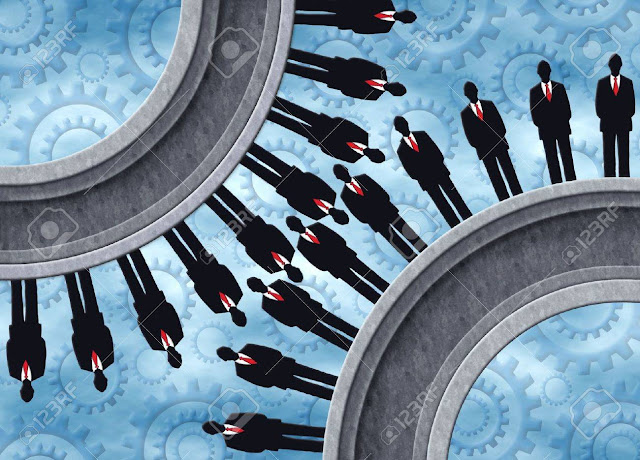Should We Have Stayed Farmers?
Explaining the Modern
Economy
"No arts; no letters; no society; and which is worst of all, continual fear, and danger of violent death; and the life of man, solitary, poor, nasty, brutish and short." Thomas Hobbes.
I recently finished a book called “Sapiens: A Brief History of Humankind” by Yuval Harari. It’s a very intriguing book with a lot of concepts and theories that will make you think about us as a species, the good and the bad (and there’s a lot of both.) One particular claim he makes, though, really made me sit back and say “whoa!” He suggests that we were all probably better off as . . . farmers? In his opinion, we gave up the agrarian life that humans had led for thousands of years, a period when we “just” had to go grow our own food then enjoy the simple pleasures of family and friends (and living until 40?) Thomas Jefferson, noted urban hater, would agree. He said, "Agriculture is our wisest pursuit, because it will in the end contribute most to real wealth, good morals, and happiness." Like Jefferson, Harari blames a lot of our real (and imagined) problems on leaving the fields to go “work for the man.”
As enticing as it sounds to go back to the soil,
it’s not going to happen. This made me think, however, about modern life and,
more importantly, about what we can - and cannot - control in it. For example,
how many and what kind of jobs there are.
In the 1940’s an economist named Joseph Schumpeter came up the idea of “creative destruction” to describe the modern economy; new ideas and businesses drive out the old, old jobs replaced with new ones. Over the last forty years or so it has destroyed millions of the jobs. True to form, it also created millions of new jobs. Many of those destroyed were ones that a majority of “working” Americans like my dad had depended upon, for example like coal mining and manufacturing, while the bulk of those created are in our so-called service economy, most with low pay and few or no benefits. Today, my dad would probably be out of luck. Like a majority of Americans, he would find that jobs for people like him either don’t exist or the pay is so low that you have to work multiple jobs to live even a vaguely average life. Or give up.
Good jobs were created too, of course. What's a good job is open for debate but I think most people would define a good job as one that pays enough for a family to raise their kids, buy a house, save for retirement and maybe take a vacation from time to time - forget saving for college education or healthcare though. Let's say 100k/yr. (Unless you live on either coast!) According to the data, 34% of households (that's families not individuals) earn that in the US. So, yes, there are good jobs - that are held by relatively few workers - but in the end we all just take the jobs the economy creates (like good, little drones as Jefferson might say?)
Now, rather than go down the “capitalism is bad” road (even though I personally doubt that what we have going on in America is actually capitalism) and blame globalism, big corporations and greedy rich guys, I choose to say this is just the reality of our economy.
Of course you should get a degree or some training for your best chance at a better job. The fact is, though, that you can get all the training you want but you will still have to take the jobs that the economy creates. For example, one of the fastest growing jobs is a Personal Care Attendant (PCA, average pay $14/hr). Other fast growing jobs: restaurant cooks, construction laborers, RNs and LPNs. Can you imagine a former coal miner or auto worker re-training for them?? Nope, nope, nope, nope and nope. There is always lawn care, nail salons and yoga instructors too - all are perfectly honorable jobs - but it's hard to envision a middle class built on them either.
We can gnash our teeth and rend our garments
about it but in the overused vernacular, it is what it is. Now add racism,
radicalism and general stupidity. And we wonder about the anger and frustration that’s
expressed through riots and electing horrific politicians across the political
spectrum?
Generally, most of us don’t think much about how complex modern life is so we may not grasp how fragile our existence has become. (See Covid or recent cold snap in TX.) Modern society, however wonderful its fruits, often breaks down and at the worst possible time for many. Today, you don’t need to do anything “wrong,” you just kinda get steamrolled by “progress” - and this is not a bug of the system, it’s a feature.
I wish life was as simple as good, old Tom Jefferson envisioned but it isn’t. It’s a complex and changing world that was impossible to foresee in the 18th century. In the blink of an eye any of us can lose our job, health, home – our future.
Fortunately, we’ve come a long way from a Hobbesian
life - but it may not seem like it for a lot of our fellow Americans. Hopefully that’s
something the rest of us can try to remember.





Doug..some great information in there. And not only would yoor dad be out of luck, but ppl my age who dont want to (or cant) retire are somewhat out of luck too. And i certainky don't
ReplyDeletehave it as bad as others... A great read though. I hope the trib prints it.